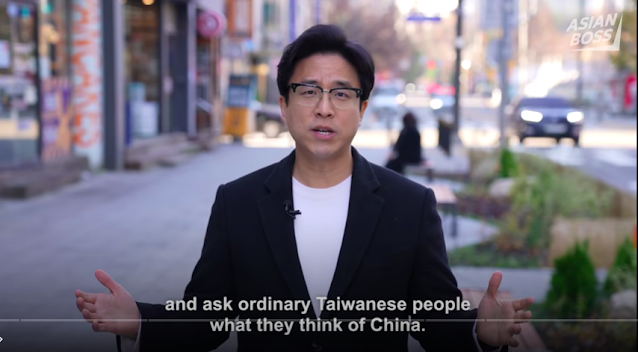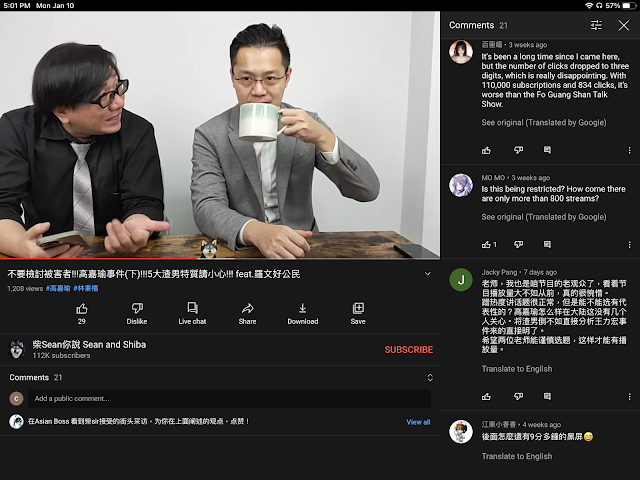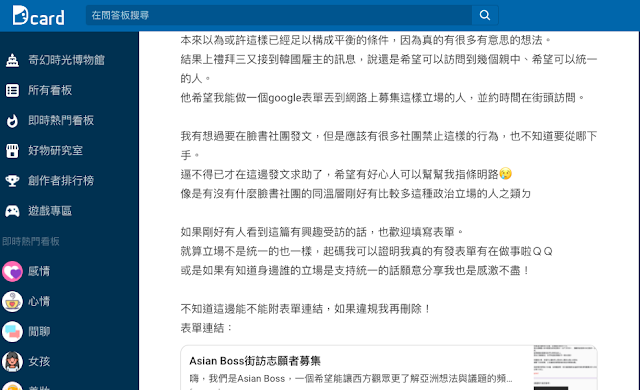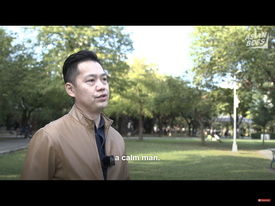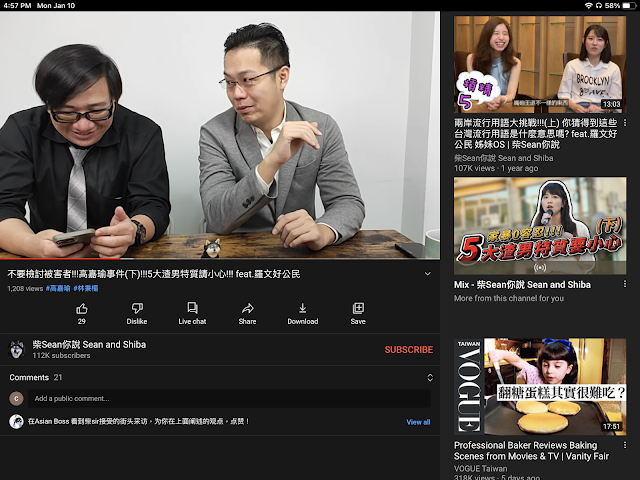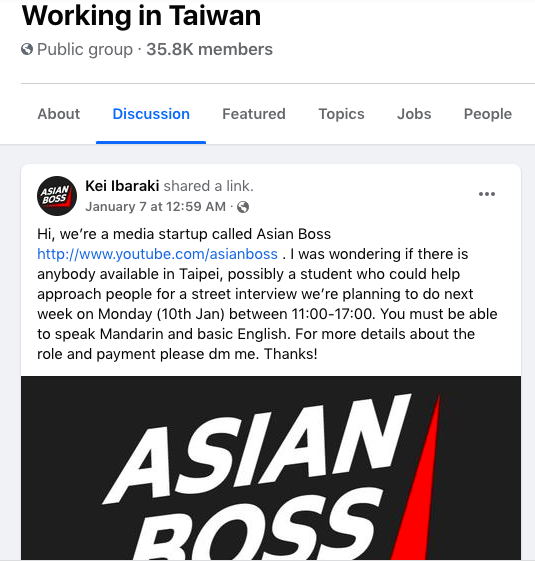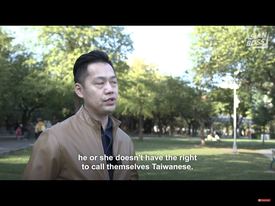
Lots of windows, but nothing inside
Recently, the Economist posted a video "explaining" the Taiwan/China situation. While just a 3.5 minutes long, it's astounding how much this short video, backgrounded by creepy History Channel Aliens music, gets so very wrong.
Without preamble, let's take a look.
The video starts with a Chinese perspective, starting listeners who may not know much about the issue with just one side's take. Although it's clear that this is China's view, it introduces the topic with words like "renegade province" and "reunification". The professor (Steve Tsang) delivering it is also quite clear that this is China's perspective, and he's not wrong about that -- but it feels unbalanced to introduce the video with just China's current beliefs, but not Taiwan's.
Following that short quote with the government position (which is the mainstream general consensus) in Taiwan would have balanced this out. While the video goes on to talk about democratization and a shift in cultural affiliation, it never actually states outright that polling data in Taiwan clearly show most Taiwanese identify as solely Taiwanese, the majority who identify as both Chinese and Taiwanese prioritize Taiwanese identity, and most Taiwanese consider the status quo to sufficiently meet the requirements to be considered an independent country. All of these things are true, and ignored in favor of a lengthy discussion on the CCP and KMT positions on the matter.
Let's dive deeper into a few quotes from the various speakers:
"At the end of the Second World War, Taiwan was handed back to the Republic of China" (emphasis theirs)
How is this possible? The Republic of China did not exist when Taiwan was ceded to Japan. Notably, the entirety of Taiwan had only been controlled by the Qing for about a dozen years; for most of their 200-year "rule" of Taiwan, they only held the western third of the island.
Regardless, you cannot hand "back" a territory to a government that did not exist when the territory was ceded.
I could add other nitpicks to this -- the fact that the status of Japan in Taiwan wasn't actually settled until the early 1950s, not the end of World War II; the question of whether any legally binding treaties support the legitimacy of the Republic of China on Taiwan; the difference between a government and an occupying force; what the Ministry of Foreign Affairs has to say about it; that giving Taiwanese ROC citizenship is not the same as naming the ROC as the legitimate government; and that even the KMT at the time recognized that it didn't have great legal standing to actually take Taiwan.
But they're beside the point -- the simple truth is that you cannot hand something "back" to a government that did not exist when the thing was given away by a different government.
"By 1949, Mao's Red Army had swept to victory, deposing Chiang Kai-shek's military dictatorship, forcing the former leader and about 1.2 million of his anti-communist supporters to retreat to Taiwan."
This is technically correct, but it maintains an iron grip on a Chinese view of Taiwan -- Taiwan from the perspective of a retreating army from China -- and completely ignores what Taiwan itself was going through at this time.
This take makes it sound like Taiwan didn't have any people, and the Nationalists arrived on a barren island devoid of people to set up a nation. In such a view, the people who already called Taiwan home in 1945 are erased. This video implies that 1.2 million people came to Taiwan and just did, y'know, whatever. It's not like there were any locals to oppose them, nothing happened on February 28, 1947!
The fact is that 1.2 million people increased Taiwan's population by a great deal, but they were still the minority. The majority of Taiwanese already living here deserve to be considered in historical views like these.
This erasure is common in older literature from Taiwan, by the way. Pai Hsien-yung, Lung Ying-tai and even the beloved Sanmao have engaged in it to some degree.
"Everyone on both sides agreed that there was one country called 'China'. They just disagreed what it was."
They most certainly did not! The only way this is true is if you consider the views of two dictatorships to be the sum total of the views of "everyone" on "both sides". I don't think that way and you shouldn't either: "everyone" includes all people, and in the mid-20th century, nobody asked Taiwanese people what they thought. There is plenty of proof that not all Taiwanese agreed that there was one country called 'China' at that time. Many, but not all.
The view of a recently-landed dictatorship that has no regard at all for the wishes of the people on the island it's retreated to -- and in fact massacres them for asking for even slightly better governance -- does not represent the views of "everyone", period.
"As economic growth surged on both sides of the Taiwan Strait, Taiwan and China let down their barriers."
These "technically true, but" statements are so interesting. Yes, economic growth surged in both countries but at different rates; China was in the doldrums of Cultural Revolution (and still recovering from the Great Leap Forward) when Taiwan's economic miracle began. China's economic advancement happened later, and far more unequally: eastern China jumped ahead, leaving behind the rest of the country as well as deep wealth inequities. China is now a bigger economy than Taiwan, but Taiwan is the more advanced economy overall, with greater wealth equality, purchasing power and GDP per capita.
The two sides did "let down" some barriers under Ma Ying-jeou, but for China this was a means to an end: unification. Ma was in on that plan, a unificationist to the core (though a closeted one for awhile). Taiwanese were literally sold a bill of goods: the promise of economic benefits without political ramifications.
The benefits never materialized -- the various agreements didn't do much for the Taiwanese economy, if anything hollowing out the job market as work was siphoned off to China -- and the political ramifications soon became clear. More on that below.
"Cultural divisions between Taiwan and the mainland deepened."
The resulting backlash was far more than a "deepening of cultural divisions". It was a pushback by Taiwanese of what, exactly, the Ma administration was aiming to do to Taiwan: render it economically dependent on China so as to make unification inevitable.
It's fortunate that this happened, as the economic effects of continuing with the Ma Ying-jeou vision would have been disastrous for Taiwan.
What does it really mean to say that "cultural divisions deepened"? This makes it sound like Taiwan and China were naturally culturally similar until democratization, at which point they naturally began to diverge. While divergence did accelerate in that time, this is not quite right. When the Nationalists arrived in 1945, unlike commentators today who seem to assume that Taiwan simply was a Chinese society returned to Chinese hands, they understood that centuries of Qing neglect as a "backwater" and a half-century of attentive, albeit repressive, Japanese rule had created in Taiwan a society that was not quite "Chinese" despite the ancestral roots of most of its inhabitants. When Sun Yat-sen visited Taiwan before 1945, he viewed it as Japanese. Even Mao did not initially envision a Communist "liberation" of Taiwan as something that would come from China, but rather something Taiwan should do for itself.
Given all this, in 1945, the KMT did everything in its power to destroy Japanese cultural memory in Taiwan and replace it with Chinese nationalism. They tore down temples and other structures, defaced buildings and pushed Mandarin Chinese, then a foreign language in Taiwan, on the population. They turned Taiwan culturally Chinese by force.
Is it really a "deepening of cultural differences" if Taiwan, after decades of this treatment, woke up and realized it had a unique history and heritage that diverged significantly from China's?
I don't think it's true that cultural differences "deepened". they were merely uncovered. It was a Taiwanese society finally able to speak for itself.
"Despite claims that it wanted a peaceful reunification with Taiwan, in 2005 China passed an anti-secession law authorizing the use of force should Taiwan formally declare independence."
Why the use of "reunification" here? Not only did the ROC not exist when Taiwan was ceded by Japan, but the People's Republic of China has never controlled Taiwan. How is a "reunification" possible between two sides that have never been united?
This part is not terrible -- it does make it clear that China poses a threat -- but it still centers a Chinese viewpoint and puts some of the responsibility for possible war on "Taiwan independence", where it doesn't belong. Taiwan is already independent; it has everything an independent country needs to govern itself, and it indeed governs itself. It's China that threatens to upend this.
This take also ignores the road the DPP is currently trying to take: one where a formal declaration of independence is not necessary, because Taiwan is already independent.
The Taiwanese view is offered far later on in the video, with this:
"The more that China shows its teeth and shows it's not willing to tolerate even a semi-democracy in a place like Hong Kong, the more that the Taiwanese people think, what kind of promise of autonomy makes any sense of us?" / "They simply will not accept the prospect of being part of a very hard authoritarian Leninist political system, whatever the economic benefits."
It really is interesting how the technically-true parts and the questionable assumptions meld together to weave a problematic narrative. There is nothing incorrect in the statement, but it leaves the listener to assume quite a bit that is not necessarily true.
First, while it's true that Chinese treatment of Hong Kong has noticeably dampened support for any sort of "unification" agreement that would include "autonomy" (essentially, One Country Two Systems), the fact is that enthusiasm for this model was on the downswing long before the tragedy of Hong Kong took place. People identifying as solely Taiwanese surpassed those who identify as both Taiwanese and Chinese in 2008 -- the year pro-unification Ma Ying-jeou was elected. The 2014 Sunflower Movement gained popular support in Taiwan just before Hong Kong experienced the Umbrella Revolution. President Tsai was elected before the 2019 Hong Kong protests.
It is safe to say that One Country Two Systems was a dead idea in Taiwan, supported by few, well before Hong Kong's downward spiral. Watching Hong Kong surely hardened or underlined that view, but the consensus already existed.
As for the "economic benefits" of unification with China, the lack of meaningful economic growth under Ma Ying-jeou shows that there likely would not be much. If anything, it would hurt the Taiwanese economy to be joined to China's. Think about it: a manufacturing base that isn't wholly trusted by the world despite so many consumer goods being made there; the CCP's certain desire that Taiwan not be too prosperous so it won't feel able to break free again; the way jobs in Taiwan were suctioned off to China where labor is cheaper after even slightly closer relations; the idea that unifying with a country with more poverty, fewer social services (it's true!), less equality and lower GDP per capital would somehow make Taiwan wealthier.
How could anyone look at all that and say that unification with China would be economically beneficial to Taiwan?
"It should be impossible to imagine this not ending peacefully, but it is also impossible to imagine this Chinese government allowing Taiwan to drift away."
Admittedly, it took me awhile to parse this statement. I've said before that for every person that asks how Taiwan could possibly become formally independent from China, they should also ask how Taiwan could possibly integrate peacefully and harmoniously into China. It can't. That's not possible. They should ask themselves whether voluntary unification is possible. It's not -- forget "remote chances" -- it's not going to happen. This trend has only pointed one way since democratization and it's not the way that leads to Taiwanese suddenly deciding China is great.
To his credit, this person does seem to pose the issue as one between a war toward annexation or China releasing its claim on Taiwan. And it's true: China deciding not to start a war is the main (well, only) way to avoid a war.
It's just a weird way to put it.
"Is America still able to deter China? That's now in real doubt."
Again, this is technically true, but it elides so much and implies that the facts of the issue are not quite what they are. First, it ignores the existence of a Taiwanese military, but Taiwan does indeed have one. It ignores the assertion by President Tsai that Taiwan could hold off the first wave of Chinese attack, which I believe. (She diplomatically avoids the likelihood that assistance would be needed after that first wave).
Yes, US support for Taiwan -- among support from other countries -- helps deter China. But this ignores the fact that Taiwan would fight regardless of US help, and implies that the US is the one stirring up this conflict by angering China. The "see, the US is really the problem here!" absolutely love this line of reasoning. The video doesn't go quite that far but gives them plenty of fodder for their gish-galloping arguments.
The opposite is true: China is stirring up this conflict because it wants something it cannot have and does not deserve -- Taiwan.
By the way, I made a video too. I think mine is better:






















